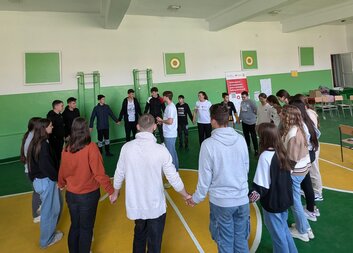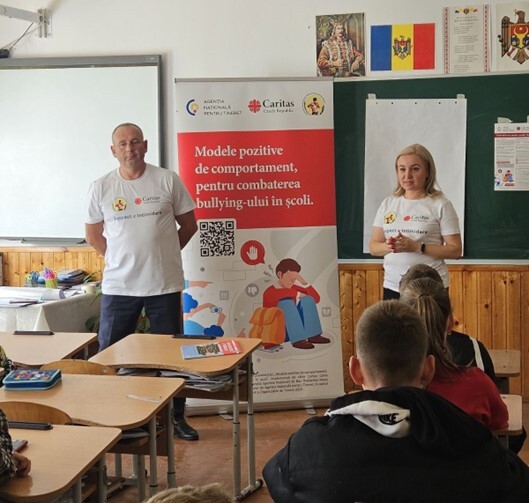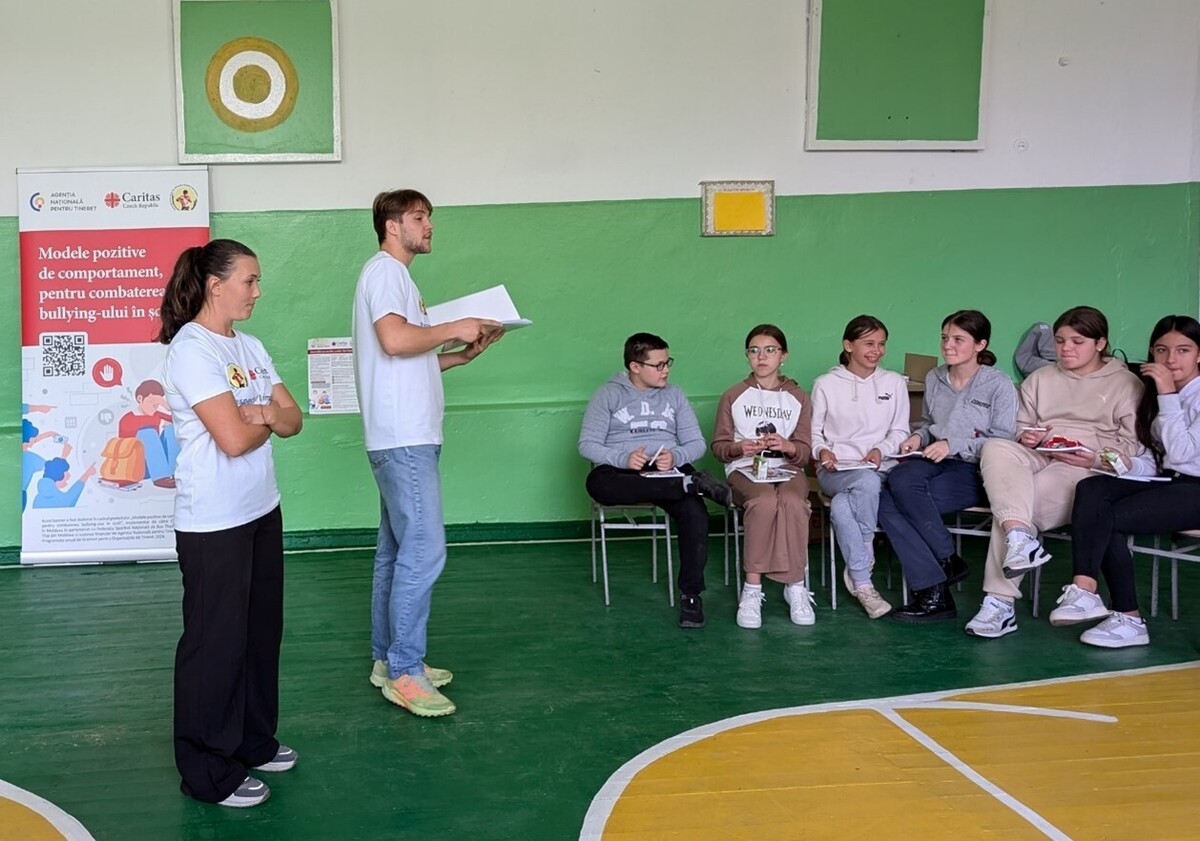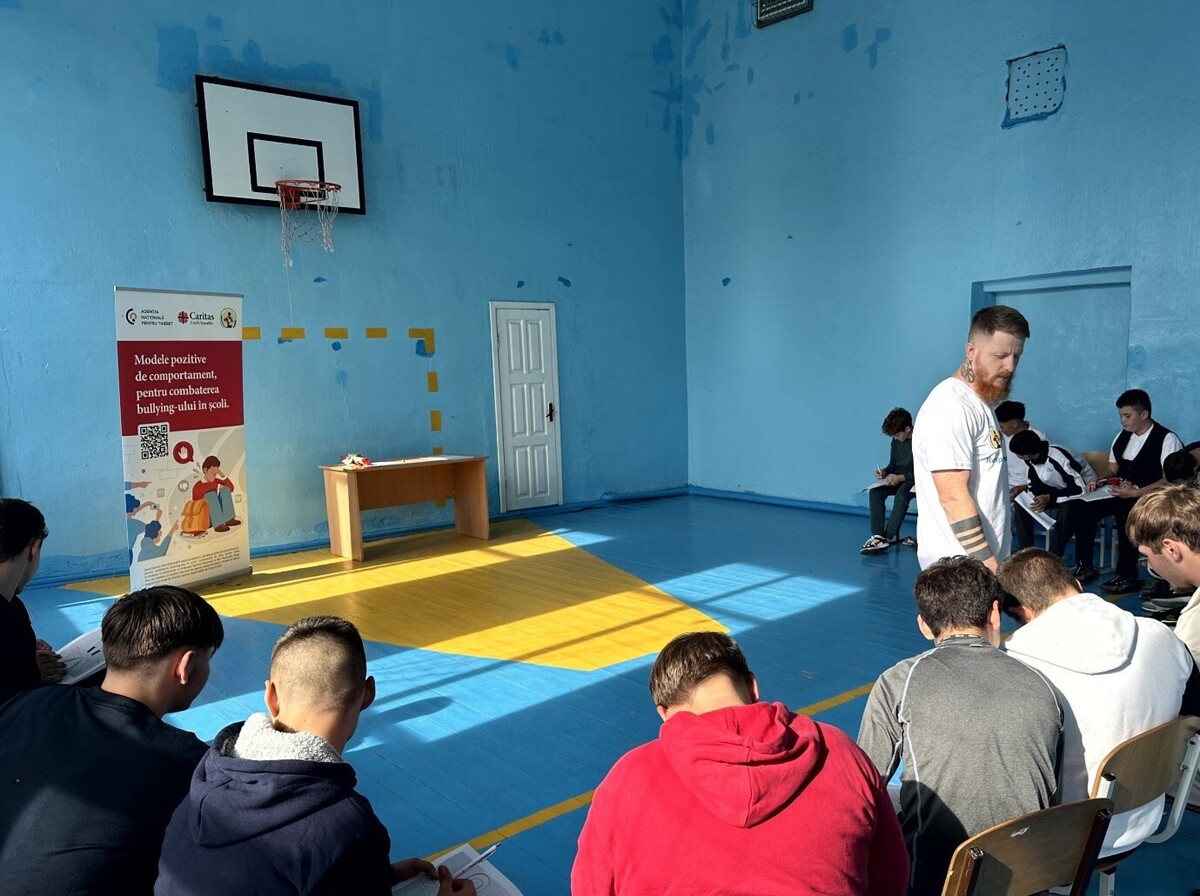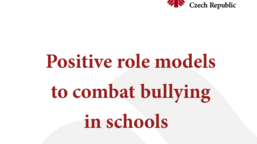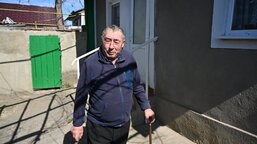Bullying remains a major issue in Moldovan schools and has widespread impact on students - whether as victims, aggressors, or witnesses. Caritas Czech Republic's new initiative in Moldova aims to help reduce bullying in schools across 8 regions of the country. Together with athletes from Moldova's National Sports Federation of Muay Thai Boxing, we have launched a series of information sessions and sports activities in 16 schools. Three athlete-coaches shared their experience working with children affected by bullying, offering valuable insights.
Could you please introduce yourself and tell us why you decided to join the initiative to combat bullying in Moldovan schools?
Liliana: I'm a teacher and the director of the Community Center in Soroca municipality. I joined this anti-bullying initiative because I want to actively contribute to the creation of a safe and friendly environment in schools, where students can develop harmoniously, free from the fear and pressure of bullying.
Nadejda: I am a kickboxing fighter, multiple national champion and children's wrestling coach. For me, the main reason would be that I was interested to find out the problems young people are facing nowadays.
Nicolai: I act as the main referee of the National Federation of K-1 Amateur K-1 and as children's wrestling coach. I was interested to see what it is like to work with children in schools.
As sportspeople and trainers, how do you perceive bullying in schools in the Republic of Moldova?
Liliana: For me bullying is a complex behaviour, which negatively affects victims, witnesses and bullies.
Nicolai: I perceive it definitely as a negative phenomenon, which must be recognised. Unfortunately, kids are shy and usually do not want to talk about it openly.
Nadejda: Bullying in my view is a behaviour that always hurts someone.
How do you believe sports can help change the behaviour of students affected by bullying, whether they are victims, bullies or bystanders?
Liliana: Sport usually helps students to develop discipline, respect and team spirit, which can significantly reduce aggressive behaviour.
Nadejda: Sportsmanship emphasises fair play, respect for opponents, sport can teach students how to resolve conflicts peacefully.
Nicolai: It's hard to give a simple answer, as it depends on the child. However, we have seen some good cases where sports have led to positive behaviour changes, though there are also instances where the opposite happens.
What are the most important life lessons you try to pass on to students during information sessions and sports activities?
Liliana: I try to pass on to the pupils values such as respect, empathy and courage to take a stand against injustice.
Nicolai: That is there are no exact life definitions. We are all human, we all have the same feelings, desires, sorrows and joys.
Nadejda: I use real-life examples and stories to illustrate the impact of bullying and the importance of taking action. During our sessions, I strive to inspire first empathy and respect, to treat everyone with kindness and dignity.
After having already completed 4 sessions with the students, can you share a moment when you noticed a positive change in a student’s behaviour?
Nadejda: One memorable moment was when a student who was withdrawn and isolated started to actively participate in group activities and even took a leadership role. This transformation was truly inspiring and showed the other students the positive impact of the programme.
Liliana: I had the opportunity to see students who, through sport and activities, became more confident and changed their attitude towards their peers.
Participating in this programme is seen as a challenge both for you as trainers and for the students. What were the hardest moments you had to overcome?
Nicolai: Many students were talking in the back, interrupting, not listening, not wanting to participate in the discussions.
Liliana: It was difficult to manage the emotions and trauma of students affected by bullying, but with perseverance and support, I’m sure we can make progress.
What would you recommend to other trainers or teachers who want to help combat bullying in schools?
Nicolai: I recommend that students for such initiatives should be chosen by the school psychologist. It's not the number that counts, but the children who need help.
Liliana: I recommend to other teachers to include group activities and to be present to support students daily.
How you see the sustainability of this initiative in the long term or how it could be scaled up to have an even bigger impact?
Nicolai: In my opinion we need to choose children who are actually struggling. It would also be good to separate the groups, the bullies, the victims. And after a couple of sessions, you could merge the groups. That's the only way I can see a greater benefit for the participants.
Liliana: In the long term, it would be great if this initiative is extended to as many schools as possible and supported through local collaborations to create lasting change in the community.
Thank you so much for your responses and collaboration in the project.
Caritas Czech Republic in Moldova
The anti-bullying project is carried out in collaboration with the National Muay Thai Boxing Federation in Moldova with the financial support of the National Youth Agency, through the annual Youth Organisation Grants Programme 2024.
Caritas Czech Republic has also opened 11 home care centres in Moldova, thanks to financial support from the Czech Development Agency, and continues to support people in need. In addition to social support, these centres offer health services. For many elderly people, a check-up with a doctor is physically and financially demanding. That is why we offer telemedicine services that allow people to connect with doctors remotely.
We have introduced telemedicine services in 8 health centres in Moldova. As part of this development, 24 medical and social workers and volunteers provide consultations and care services for the elderly or people in need of permanent care.

